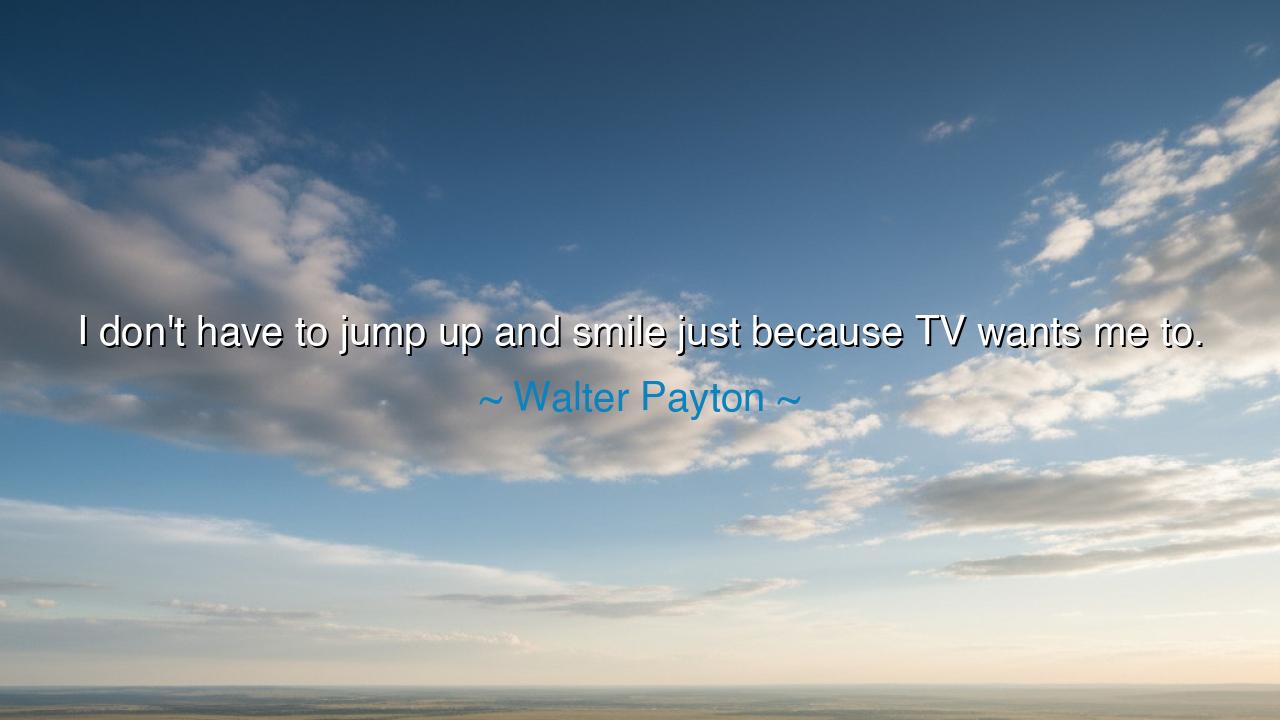
I don't have to jump up and smile just because TV wants me to.






The words of Walter Payton ring with the dignity of a man who knew both the weight of fame and the worth of authenticity: “I don’t have to jump up and smile just because TV wants me to.” These words strike at the heart of a timeless conflict—the struggle between appearance and reality, between the image demanded by society and the truth of one’s own soul. In them, Payton, one of the greatest athletes to ever grace the field, declares that his humanity cannot be reduced to performance, nor his emotions dictated by the machinery of spectacle.
To smile when the heart is weary may sometimes be kindness; but to be compelled to smile, to feign joy for the appetites of others, is a form of slavery. Payton’s refusal is not arrogance, but integrity. He reminds us that true strength is not in yielding to every expectation, but in standing firm in authenticity. Just as a warrior cannot swing his sword on command for entertainment, but only when honor calls, so the soul must not be forced into false gestures by the glare of the camera.
The TV, in this saying, becomes a symbol of the world’s demand for constant performance. In ancient times, it was not television but the crowd in the coliseum, demanding blood or laughter, regardless of the man beneath the armor. Gladiators were cheered as heroes, yet their humanity was ignored; their joy or sorrow mattered less than the entertainment they provided. Payton, in his own way, declares that he is not a gladiator for the crowd’s delight, but a man whose worth extends beyond the spectacle of sport.
History bears witness to many who refused the mask of forced cheer. Consider Abraham Lincoln, who during the darkest days of the Civil War was often urged to project unyielding optimism. Yet Lincoln’s melancholy was no secret, and he did not disguise it with hollow cheer. Instead, he led with honesty, and his somber face reminded the nation that their trials were real, that sacrifice was grave. In the same way, Payton’s refusal to play the clown for the cameras teaches that true leadership and true greatness do not always wear a painted smile.
There is also something heroic in this resistance. For to deny the demand of TV, or of any worldly power, is to reclaim one’s humanity. Payton shows that he is more than a product, more than a performer. He is a father, a teammate, a man of flesh and spirit, and no lens has the right to command his emotions. This courage is not loud, but it is profound—for it is easier to comply, to smile falsely, than to stand in the quiet strength of one’s truth.
The deeper meaning of his words is that joy must be genuine, and respect must flow both ways. If society values its heroes only when they dance and grin on command, then society itself is poor. A smile is sacred when it is real, for it springs from the heart; when forced, it loses all power. Payton knew this, and in protecting the sanctity of his smile, he preserved his soul from being consumed by performance.
The lesson for us is clear: guard your authenticity. Do not let the world, whether through TV, applause, or expectation, force you to wear a face that is not your own. Your worth lies not in how convincingly you can act for others, but in how steadfastly you can remain true to yourself. Offer your smile freely, but never let it be commanded. In doing so, you honor not only your own dignity but the sacredness of joy itself.
Thus, Walter Payton’s words endure as more than defiance—they are a teaching for all ages. Do not allow the noise of the crowd or the glare of the lights to strip away your humanity. Remember that the truest victories are not won on the field or before the camera, but in the quiet, unshaken strength of a soul that dares to be real.






AAdministratorAdministrator
Welcome, honored guests. Please leave a comment, we will respond soon